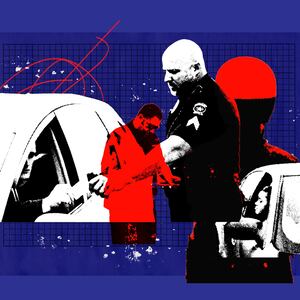Police work requires split-second decisions, which can lead to honest mistakes. But what happened to New Mexico motorist Mario Rosales in 2018 was something else.
While driving home in his Ford Mustang, he legally passed a pickup truck, and the other driver started tailgating him. Road rage can be deadly, so Rosales grew concerned.
No matter which way he went, the truck stayed in his rearview mirror. Rosales eventually reached his home in Roswell, New Mexico, hoping the truck would keep going. Instead, the vehicle blocked Rosales in his driveway, and the stranger behind the wheel started yelling and cursing at him.
At this point Rosales was not just concerned. He was scared for himself and his family members in the house.
He owned a handgun that he could lawfully open carry, so he stepped out of his Mustang with the weapon displayed on his waist. He kept his hands away from the gun in a defensive stance and remained calm.
During the tense exchange, the assailant identified himself as a law enforcement officer, though he was driving an unmarked vehicle and wearing plainclothes with flip flops—none of which bore law enforcement insignia.
Rosales complied with all commands and tried to deescalate the situation, but the officer drew his weapon and pointed it at Rosales—who had done nothing wrong other than fail to use a turn signal when the officer was tailing him around every street corner.
The officer, who had his child in the passenger’s seat, was fired from the Chaves County Sheriff’s Office and convicted of aggravated assault and child endangerment. Yet Rosales hit a roadblock when he sued the deputy.
A federal district judge agreed that if Rosales could prove his allegations, the deputy would be guilty of constitutional violations. But the judge also held that the deputy was entitled to qualified immunity, which meant Rosales was stuck.
Qualified immunity, a judge-made doctrine, protects government employees from civil liability unless their misconduct is “clearly established” in prior cases as unconstitutional. The U.S. Supreme Court said so in 1982)" href="https://urldefense.com/v3/__https://www.ncsl.org/civil-and-criminal-justice/qualified-immunity__;!!LsXw!TQTDIHx1JaRd4sVIXJ3KWP-wIDsjfZMEtWlMZn-kB3OTfyaX6HbjXeIMmHNXxbZU1QISkMep6CKWMdWnom_FTA$">1982. Since then, beneficiaries have used qualified immunity to escape accountability for torturing)" href="https://urldefense.com/v3/__https://www.newsweek.com/prison-inmate-qualified-immunity-protect-officials-constitution-civil-rights-723943__;!!LsXw!TQTDIHx1JaRd4sVIXJ3KWP-wIDsjfZMEtWlMZn-kB3OTfyaX6HbjXeIMmHNXxbZU1QISkMep6CKWMdW6j2PPqA$">torturing prison inmates, stealing)" href="https://urldefense.com/v3/__https://ij.org/press-release/police-stole-225k-in-cash-and-coins-and-the-courts-said-okay/__;!!LsXw!TQTDIHx1JaRd4sVIXJ3KWP-wIDsjfZMEtWlMZn-kB3OTfyaX6HbjXeIMmHNXxbZU1QISkMep6CKWMdU_AENldQ$">stealing cash, retaliating)" href="https://urldefense.com/v3/__https://www.texastribune.org/2023/01/06/first-amendment-laredo-journalist/__;!!LsXw!TQTDIHx1JaRd4sVIXJ3KWP-wIDsjfZMEtWlMZn-kB3OTfyaX6HbjXeIMmHNXxbZU1QISkMep6CKWMdXgndSGjA$">retaliating against critics, and hundreds of other abuses.
Defenders of the doctrine say it is necessary to protect officers who make split-second decisions, so they don’t hesitate when lives are on the line. Essentially, these defenders see qualified immunity as a buffer against Monday morning quarterbacks.
What happened to Rosales blows up this narrative. The deputy who followed him home was not called by duty to defuse a threat. He was the threat. And he had ample time to think about what he was doing.
Other cases show even more opportunity for careful calculation. The mayor and police chief in Castle Hills, Texas, plotted revenge against a City Council rival over a period of weeks. After hatching a plan to arrest and jail her on bogus charges)" href="https://urldefense.com/v3/__https://ij.org/case/castle-hills-retaliation/__;!!LsXw!TQTDIHx1JaRd4sVIXJ3KWP-wIDsjfZMEtWlMZn-kB3OTfyaX6HbjXeIMmHNXxbZU1QISkMep6CKWMdVQT3nFvA$">bogus charges, they had time to sleep on it before acting. Despite their slow-motion constitutional violations, they received qualified immunity.
Two additional mechanisms exist to hold government employees accountable. They can face internal discipline and criminal prosecution, which both happened in New Mexico. Yet public agencies have a poor record of policing themselves, and neither of these actions addresses constitutional violations. Only civil litigation can do that—and only if courts allow it.
Rather than give up, Rosales appealed with representation from our public interest law firm, the Institute for Justice.
His tenacity paid off on July 5, 2023, when the 10th U.S. Circuit Court of Appeals reversed the decision granting qualified immunity. The three-judge panel recognized that courts “can protect officers’ ability to make reasonable split-second law-enforcement decisions when dealing with suspected violent criminals without protecting an officer who was himself the only violent criminal on the scene.”
The keyword is “reasonable,” the standard embedded in the Fourth Amendment. Humans make mistakes when rushed, which is why quarterbacks throw interceptions. But that’s not why qualified immunity exists. Competent officers acting in good faith don’t need a get-out-of-jail-free card. The Constitution already protects them.
The 10th Circuit gets it. If citizens like Rosales must obey the law, then the officers who police them must obey the Constitution—especially when they act with criminal motives and have time for premeditation.
Marie Miller is an attorney and Daryl James is a writer at the Institute for Justice in Arlington, Virgina.










